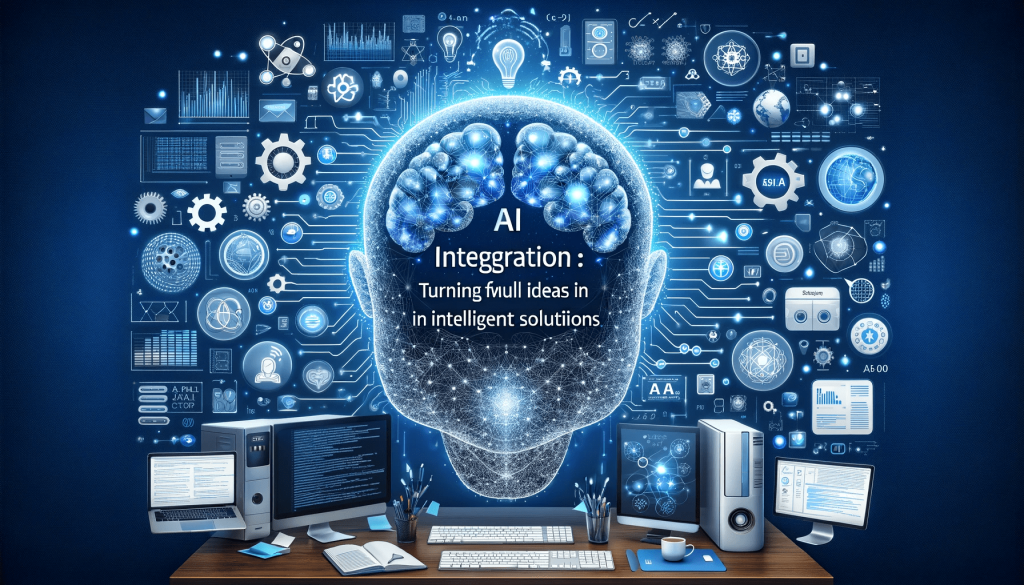Innovative AI Applications: Changing the Face of Business

Artificial Intelligence (AI) has rapidly evolved from a futuristic concept to a practical tool that is transforming various sectors of business. By leveraging AI technologies, businesses can achieve unprecedented levels of efficiency, innovation, and customer satisfaction. This blog post explores the transformative potential of AI, its applications across different industries, and practical tips for successfully implementing AI in business operations.
Introduction
Imagine a world where machines not only assist with repetitive tasks but also provide insights, make decisions, and enhance customer experiences. This is the reality that AI brings to the business landscape. From healthcare to finance, retail to manufacturing, AI is revolutionizing how companies operate and compete. In this post, we will delve into the core technologies behind AI, its applications across different industries, and the benefits and challenges of adopting AI.
What is AI?
Artificial Intelligence (AI) refers to the simulation of human intelligence in machines programmed to think, learn, and solve problems. Key technologies driving AI include:
- Machine Learning (ML): Algorithms that enable systems to learn from data and improve over time without explicit programming.
- Deep Learning: A subset of ML that uses neural networks with many layers (deep networks) to analyze various factors of data.
- Natural Language Processing (NLP): Technology that enables machines to understand, interpret, and respond to human language.
AI is becoming increasingly important in the business world as companies seek to harness its power to gain a competitive edge and drive innovation.
Innovative AI Applications Across Industries
Healthcare
AI is transforming healthcare by improving diagnostics, personalizing treatment plans, and enhancing administrative efficiency.
- Diagnostics: AI algorithms analyze medical images and patient data to detect diseases such as cancer more accurately and quickly.
- Personalized Medicine: AI helps in tailoring treatments to individual patients based on their genetic information and health history.
- Administrative Efficiency: AI automates administrative tasks such as patient scheduling, billing, and managing electronic health records, freeing up time for healthcare professionals.
Finance
In the finance sector, AI enhances fraud detection, automates trading, and improves customer service.
- Fraud Detection: AI systems analyze transaction patterns to identify and prevent fraudulent activities in real-time.
- Algorithmic Trading: AI-driven algorithms make trading decisions at speeds and volumes beyond human capabilities, optimizing investment strategies.
- Customer Service Automation: AI-powered chatbots and virtual assistants handle customer inquiries, provide financial advice, and streamline banking services.
Retail
Retailers leverage AI to personalize marketing, manage inventory, and enhance customer experiences.
- Personalized Marketing: AI analyzes customer behavior and preferences to deliver targeted marketing campaigns and product recommendations.
- Inventory Management: AI predicts demand and optimizes stock levels, reducing overstock and stockouts.
- Customer Experience Enhancement: AI-powered virtual shopping assistants and chatbots provide personalized shopping experiences and support.
Manufacturing
AI improves manufacturing through predictive maintenance, quality control, and supply chain optimization.
- Predictive Maintenance: AI predicts equipment failures before they occur, reducing downtime and maintenance costs.
- Quality Control: AI systems inspect products for defects during the manufacturing process, ensuring high quality.
- Supply Chain Optimization: AI optimizes supply chain operations by predicting demand, managing inventory, and selecting suppliers.
Transportation and Logistics
AI enhances transportation and logistics through route optimization, autonomous vehicles, and fleet management.
- Route Optimization: AI analyzes traffic patterns and delivery schedules to find the most efficient routes.
- Autonomous Vehicles: AI drives self-driving cars and trucks, improving safety and reducing labor costs.
- Fleet Management: AI optimizes fleet operations by monitoring vehicle performance and managing maintenance schedules.
Customer Service
AI-powered customer service solutions improve interactions and satisfaction through chatbots, virtual assistants, and sentiment analysis.
- Chatbots: AI chatbots handle customer inquiries, providing instant responses and freeing up human agents for complex issues.
- Virtual Assistants: AI assistants help customers with tasks such as booking appointments, making purchases, and resolving issues.
- Sentiment Analysis: AI analyzes customer feedback to gauge satisfaction and identify areas for improvement.
Benefits of AI Applications for Businesses
Increased Efficiency
AI automates repetitive tasks and optimizes processes, saving time and resources and allowing employees to focus on more strategic activities.
Enhanced Decision-Making
AI provides data-driven insights that enable more accurate and timely business decisions, enhancing strategic planning and execution.
Improved Customer Experience
AI personalizes interactions and provides faster, more effective service, leading to higher customer satisfaction and loyalty.
Innovation and Competitive Edge
AI drives innovation by enabling new business models and capabilities, helping companies stay ahead of competitors.
Real-World Case Studies
Case Study 1: AI in Retail
A major retailer implemented an AI-driven inventory management system that reduced stockouts by 30% and cut excess inventory by 20%. This improvement led to significant cost savings and increased customer satisfaction.
Case Study 2: AI in Healthcare
A healthcare provider used AI to analyze patient data and predict disease outbreaks, allowing for timely interventions and improved patient outcomes. This initiative reduced hospital readmissions by 15%.
Challenges and Considerations in Adopting AI
Data Quality and Management
Ensuring high-quality data is essential for accurate AI analysis. Businesses must invest in data cleansing and management to ensure reliable results.
Ethical and Legal Issues
AI raises ethical and legal concerns, such as data privacy, algorithmic bias, and compliance with regulations like GDPR. Companies must address these issues to maintain trust and avoid legal repercussions.
Skill Gaps
Implementing AI requires specialized skills. Businesses need to invest in training and hiring skilled data scientists, engineers, and AI specialists.
Integration with Existing Systems
Integrating AI solutions with legacy systems can be challenging. Companies must plan for seamless integration to fully realize AI’s benefits.
Practical Tips for Implementing AI
Identifying Use Cases
Start with clear, high-impact AI use cases aligned with business goals. Prioritize projects that offer quick wins and scalable results.
Investing in Talent
Build or acquire the necessary AI expertise within the organization. Provide ongoing training to keep skills up-to-date.
Collaborating with AI Experts
Partner with AI vendors, consultants, and research institutions for guidance and support. Leverage their expertise to accelerate AI initiatives.
Scaling AI Efforts
Develop a strategy for scaling AI initiatives across the organization. Start small, measure success, and expand based on proven results.
Resources for Further Learning
- Articles: “Artificial Intelligence: A Modern Approach” by Stuart Russell and Peter Norvig
- Courses: “Machine Learning” by Andrew Ng on Coursera, “AI For Everyone” on Coursera
- Communities: AI Alignment Forum, Machine Learning Mastery
Conclusion
Artificial Intelligence is transforming the business landscape, offering unprecedented opportunities for efficiency, innovation, and competitive advantage. By understanding AI technologies, exploring innovative applications, and addressing implementation challenges, businesses can harness the power of AI to drive significant outcomes. Embrace AI innovations to transform your business operations and drive future growth.
AI has the potential to revolutionize every aspect of business. By starting with clear use cases, investing in talent, and collaborating with experts, businesses can successfully integrate AI into their operations and achieve long-term success. Embrace the transformative power of AI and unlock new opportunities for growth and innovation.






 and then
and then
Responses